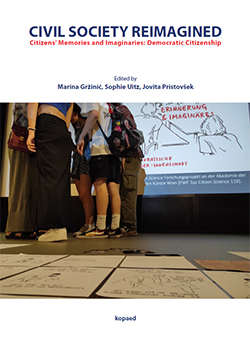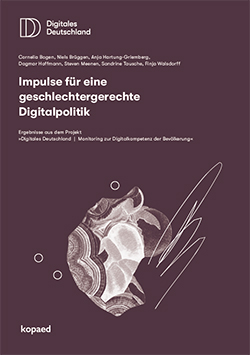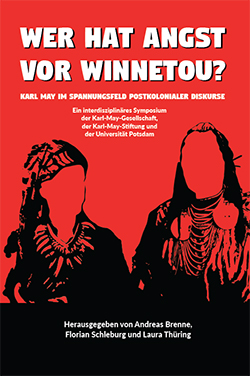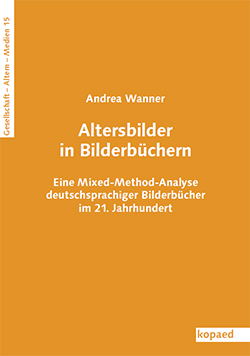Medien und Gesellschaft
CIVIL SOCIETY REIMAGINED
Citizens’ Memories and Imaginaries: Democratic Citizenship
München 2024, 100 Seiten
ISBN 978-3-96848-106-7
Im Verlagsprogramm unter
Produktbeschreibung
This book is the result of the Citizen Science research project Citizens’ Memories and Imaginaries: Democratic Citizenship (2022 to 2024). It documents how some of the principles of Citizen Science can be used in combination with arts and artistic research by engaging high-school students as citizen scientists and artists, and how social and community issues can be addressed in new ways. The research project was conducted at the Institute for Fine Arts at the Academy of Fine Arts Vienna, under the leadership of Univ. Prof. Dr. Marina Gržinić (Studio for Post-Conceptual Art Practices) with her research team, Dr. Sophie Uitz and Dr. Jovita Pristovšek.
Inhaltsverzeichnis
Introduction
By Marina Gržinić
PART 1
Why This Book?
By Marina Gržinić, Jovita Pristovšek and Sophie Uitz
Theory: What Changed in Forty Years of Imagining Communities?
By Marina Gržinić, Jovita Pristovšek and Sophie Uitz
Practice: On the Methodology of Doing Democratic Citizenship in the Classroom
By Sophie Uitz
PART 2
SCIENTISTS AND ARTISTS
Us and Them: Mechanisms of Social Inclusion and Exclusion, Past and Present
By Bernhard Weidinger
(Un-)Imagined Friendships – Diversity Troubles in School
By Assimina Gouma
Vienna Wiesenthal Institute for Holocaust Studies
By Éva Kovács
Rap and Utopia: About Life and Politics of Migrant Youth
Interview with Esra Özmen aka EsRAP
By Marina Gržinić and Sophie Uitz
Imag(in)e in Full Color – Mapping the Self-Portrait
By Ndidi J. Iroh
TEACHERS AND STUDENTS
Strengthening Classroom Communities and Combating Discrimination in School: Teacher’s Perspective
Interview with Lisa Hartmann
By Sophie Uitz
A Perspective
By Catherine Lehnerer
PART 3
PARALLELS
Views on Queer Content in Serbian Education
By Saša Kesić
“Teachers don’t wanna teach what we wanna be taught.”
Thoughts on Mattering Black Critiques of Racism in the Glocal Austrian Classroom
By Araba Evelyn Johnston-Arthur
PART 4
Conclusion
By Marina Gržinić
Notes on the Contributors
PART 5
Visual Archive
By Marina Gržinić
PART 1
Why This Book?
By Marina Gržinić, Jovita Pristovšek and Sophie Uitz
Theory: What Changed in Forty Years of Imagining Communities?
By Marina Gržinić, Jovita Pristovšek and Sophie Uitz
Practice: On the Methodology of Doing Democratic Citizenship in the Classroom
By Sophie Uitz
PART 2
SCIENTISTS AND ARTISTS
Us and Them: Mechanisms of Social Inclusion and Exclusion, Past and Present
By Bernhard Weidinger
(Un-)Imagined Friendships – Diversity Troubles in School
By Assimina Gouma
Vienna Wiesenthal Institute for Holocaust Studies
By Éva Kovács
Rap and Utopia: About Life and Politics of Migrant Youth
Interview with Esra Özmen aka EsRAP
By Marina Gržinić and Sophie Uitz
Imag(in)e in Full Color – Mapping the Self-Portrait
By Ndidi J. Iroh
TEACHERS AND STUDENTS
Strengthening Classroom Communities and Combating Discrimination in School: Teacher’s Perspective
Interview with Lisa Hartmann
By Sophie Uitz
A Perspective
By Catherine Lehnerer
PART 3
PARALLELS
Views on Queer Content in Serbian Education
By Saša Kesić
“Teachers don’t wanna teach what we wanna be taught.”
Thoughts on Mattering Black Critiques of Racism in the Glocal Austrian Classroom
By Araba Evelyn Johnston-Arthur
PART 4
Conclusion
By Marina Gržinić
Notes on the Contributors
PART 5
Visual Archive




